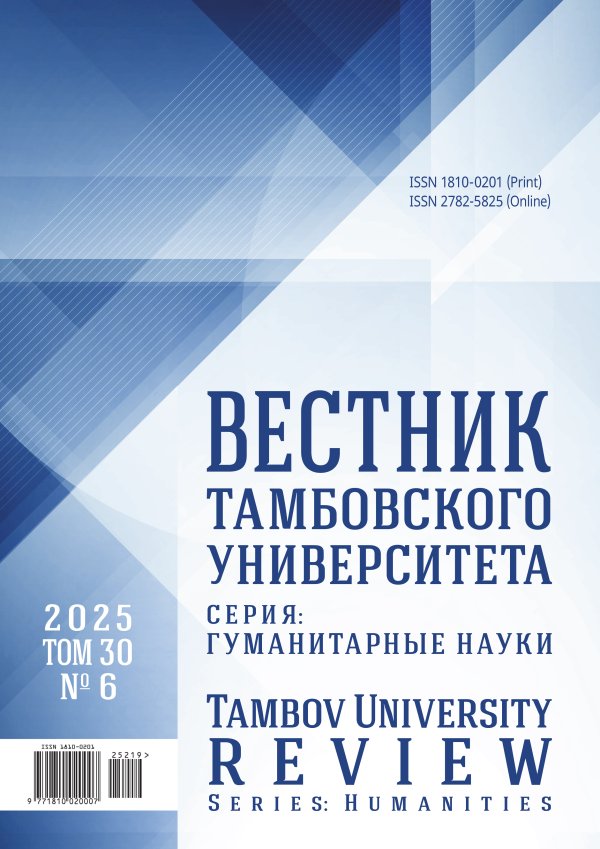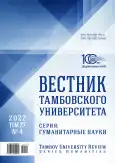Методические аспекты развития умения говорения студентов факультета иностранных языков при смешанном формате обучения
- Авторы: Коновалова О.В.1
-
Учреждения:
- ФГБОУ ВО «Курский государственный университет»
- Выпуск: Том 27, № 4 (2022)
- Страницы: 988-998
- Раздел: ТЕОРИЯ И МЕТОДИКА ОБУЧЕНИЯ ИНОСТРАННОМУ ЯЗЫКУ
- URL: https://journal-vniispk.ru/1810-0201/article/view/298273
- DOI: https://doi.org/10.20310/1810-0201-2022-27-4-988-998
- ID: 298273
Цитировать
Полный текст
Аннотация
Актуальность исследования обусловлена необходимостью формирования и развития умения говорения у студентов на факультете иностранных языков при смешанной форме обучения и недостаточной разработанностью теоретических и технологических инструментов для эффективной реализации данного процесса. Смешанное обучение рассмотрено как особый вид образовательной деятельности, при котором происходит чередование традиционных и дистанционных образовательных технологий. Считаем, что смешанное обучение обладает значительным потенциалом для организации процесса иноязычного образования в целом и обучения говорению студентов факультета иностранных языков в частности. Освещена специфика и преимущества смешанной формы обучения для иноязычного образования, а также приведены конкретные методы, приемы и задания, которые могут быть успешно имплементированы в процесс обучения говорению при смешанном формате образования. Целью исследования является представление технологических аспектов обучения говорению студентов факультета иностранных языков при смешанном формате обучения и разработка учебно-методического обеспечения, направленного на реализацию данного процесса. Новизна исследования заключена в том, что в нем проанализированы цифровые ресурсы, которые могут быть эффективно использованы в процессе обучения говорению при смешанном образовательном формате, а также представлены примеры специально разработанных упражнений на развитие умения говорения, которые могут применяться в процессе подготовки будущих специалистов иноязычного образования при сочетании традиционной и онлайн-форм обучения.
Об авторах
О. В. Коновалова
ФГБОУ ВО «Курский государственный университет»
Автор, ответственный за переписку.
Email: cherrygarcia@yandex.ru
ORCID iD: 0000-0001-7015-0838
кандидат педагогических наук, доцент кафедры теории языка и методики преподавания иностранных языков
305000, Российская Федерация, г. Курск, ул. Радищева, 33Список литературы
- Holmberg B. The evolution, principles and practices of distance education. Oldenburg, 2005. 171 p.
- Bersin J. “How Did We Get Here? The History of Blended Learning”. The Blended Learning Book: Best Practices, Proven Methodologies, and Lessons Learned. San Francisco: John Wiley & Sons, 2004. 319 p.
- Friesen N. Defining Blended Learning: Report. 2012. 10 p. URL: https://www.normfriesen.info/papers/Defining_Blended_Learning_NF.pdf (accessed: 18.02.2022).
- Garrison D.R., Kanuka H. Blended learning: Uncovering its transformative potential in higher education // The Internet and Higher Education. 2004. Vol. 7. № 2. P. 95-105. https://doi.org/10.1016/j.iheduc.2004.02.001
- Bonk C.J., Graham C.R. The handbook of blended learning: Global perspectives, local designs. San Francisco: Jossey-Bass; Pfeiffer, 2006. 624 p.
- Graham C.R. Blended learning systems: Definition, current trends, and future directions. 2006. 33 p.
- Watwood B., Nugent G., Deihl W. Building from Content to Community: Rethinking the Transition to Online Teaching and Learning. Virginia: Virginia Commonwealth University: Center for teaching excellence, 2009. 22 p. https://doi.org/10.13140/RG.2.1.4357.1043
- Bernard R.M., Borokhovski E., Schmid R.F., Tamim R.M., Abrami P.C. The metaanalysis of blended learning and technology use in higher education: From the general to the applied // Journal of Computing in Higher Education. 2014. Vol. 26. № 1. P. 87-122.
- Siemens G., Gašević D., Dawson S. Preparing for the Digital University: a review of the history and current state of distance, blended, and online learning. Athabasca: Athabasca University, 2015. 235 p. https://doi.org/10.13140/RG.2.1.3515.8483
- Полат Е.С. и др. Теория и практика дистанционного обучения / под ред. Е.С. Полат. М.: Изд. центр «Академия», 2004. 416 с.
- Капустин Ю.И. Педагогические и организационные условия эффективного сочетания очного обучения и применения технологий дистанционного образования: автореф. дис. … д-ра пед. наук. М., 2007. 40 с.
- Сысоев П.В., Евстигнеев М.Н. Методика обучения иностранному языку с использованием новых информационно-коммуникационных интернет-технологий. Москва: Глосса-Пресс; Ростов-на-Дону: Феникс, 2010. 177 с.
- Twigg C.A. Improving learning and reducing costs: Lessons learned from round I of the PEW grant program incourse redesign. Troy: Centre for Academic Transformation, Rensselaer Polytechnic Institute, 2003. P. 306-331.
- Cai H. E-learning and English Teaching // Procedia – Social and Behavioral Sciences. 2012. Vol. 2. P. 841-846. https://doi.org/10.1016/j.ieri.2012.06.180
- Kim S.H. Developing autonomous learning for oral proficiency using digital storytelling // Language Learning & Technology. 2014. Vol. 18. Issue 2. P. 20-35.
- Menggo S., Suastra I.M., Budiarsa M., Pandmadewi N.N. Needs Analysis of Academic-English speaking material in promoting 21 century skills // International Journal of Instruction. 2019. Vol. 12. Issue 2. P. 739-754. https://doi.org/10.29333/iji.2019.12247a
- Сысоев П.В., Евстигнеев М.Н. Использование новых учебных интернет-технологий в обучении иностранному языку (на материале культуроведения США) // Вестник Тамбовского университета. Серия: Гуманитарные науки. 2008. Вып. 2 (58). С. 363-371.
Дополнительные файлы









